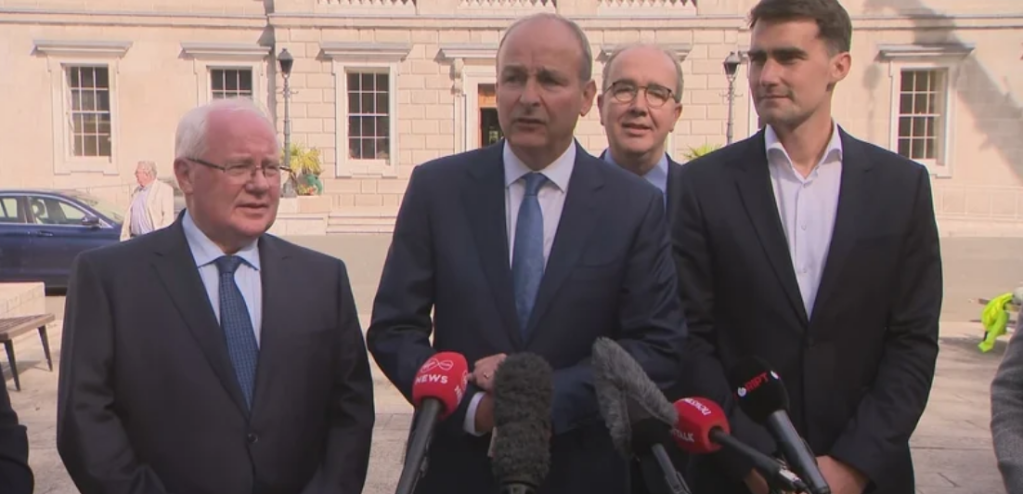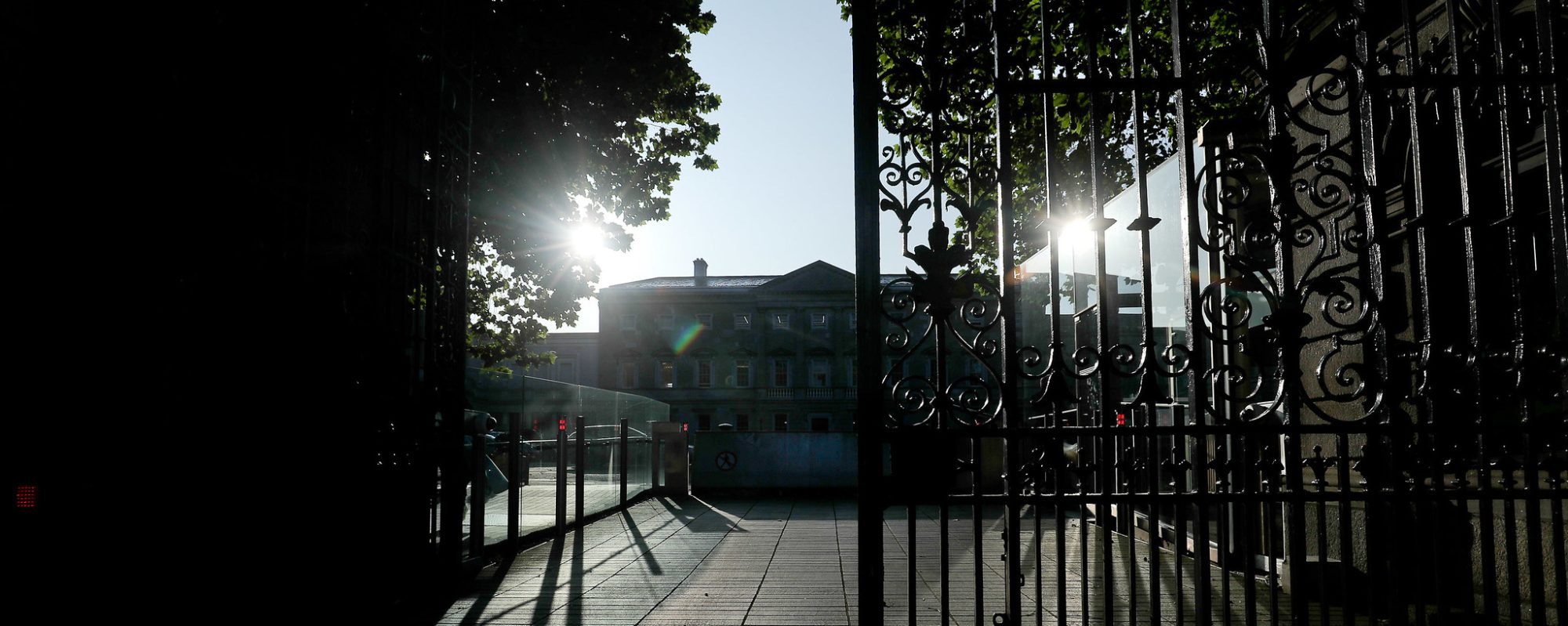In this column I look at the changes since the 2024 Local and European elections and consider their ramifications and the possibility of even further changes. Though Fianna Fáil and Fine Gael are understandably exuberant after each securing 23% of the votes of those who showed up… anyone imagining this as a sign of greater things to come, should think twice. This column forms the basis of my latest Mooney on Politics podcast.

I have lost count of how many times I have started this week’s script and then had to rethink or rewrite it. These drafts have not been overtaken by events, as such, but rather by my taking a little more time to stand back and (attempt) to take a bigger overview of:
- what has happened, and
- what may be about to happen next
The first draft started with this pithy and succinct summary of the local and European election results, sent to me by a colleague soon after the first count results were announced in a number of councils:
Voters think the government is crap… but they think the opposition is crappier
Who could disagree… apart from the leaderships of the three main parties… or should we term those the two and a half main parties?
While analysts and pundits may disagree about the nature and extent of the implications of those results, it is clear is that the results have changed things. Elections do change things, even when you think the results are not all that significant.
We are seeing some of that change already.
Eamon Ryan’s departure as Green party leader, and as a TD from the next election, will have significant impact on that party and its place in Irish politics.
Eamon was both an effective communicator. What he lacked in zeal and energy, he made up for it with approachability and… well… likeability.
The personal warmth of the tributes from people like Jackie Healy-Rae and Mattie McGrath, neither of whom could be described as eco-warriors, were in stark contrast to the snarkiness of Sinn Féin’s Matt Carty. This will be my only reference to the Shinners in this piece as their electoral performance, or non-performance, merits a podcast of its own.
I will save that for after the Westminster elections, where it already looks certain that Sinn Féin’s mission to unseat Colum Eastwood MP and even further squeeze the SDLP will come unstuck.
The other change is the likely departure this week of Michael McGrath, three months before what would have been his second budget as Finance Minister. More on this one later.
Understandably, Fianna Fáil and Fine Gael have been in self-congratulatory mood since the local election boxes were opened. Though it may seem churlish to try to rain on their parades, I get the sense that what we are seeing from both parties – though more from FG than FF – is more an over exuberant sense of relief, than of unalloyed joy.
Getting 23% when you feared you would get 20%, is a cause to heave a sigh and have a few celebratory beers, but it should not be misinterpreted as a sign of better things to come.
Yes, the notion of a single party getting 40% in an election is not on the horizon, but I see no cause to celebrate support levels in the low 20s at a time when the economy is sound, and we have low unemployment.
This applies to both parties, but perhaps even more so to Fianna Fáil. Fine Gael has now been in continuous office since early 2011. So, it is more understandable that its support is back down to its base level.
In the 2016 and 2020 elections I voted to put Fine Gael out of government because it was squandering the very real opportunities of the recovery.
Yet, though Fine Gael’s support plummeted across that time from 36% in 2011 to 25.5% in 2016 to 21% in 2020, it still remained in government. The idea that a party can lose over 40% of its support and still cling on to office and act as if nothing has changed, does not help our politics.
Nor does it help the party that enabled it to do that. But I will not go refight that argument. Along with several others, we opposed the 2020 PfG on this basis. The majority of the Fianna Fáil membership disagreed with us.
But while the argument is over. The consequences continue. They both help and hinder Fianna Fáil.
Help: by enabling Fianna Fáil to gain from Fine Gael transfers, e.g. Cynthia Ní Mhurchú’s impressive MEP win in South.
Hinder: by diluting Fianna Fáil’s identity, particularly among urban voters… not just Dublin voters.
As Thomas Jefferson famously remarked:
“We do not have government by the majority. We have government by the majority who participate.”
The fact that you can get 23% of the 50% who show up in June 2024 is not a guarantee that you will get 23% of the 60-65% who participate the next time.
And, while every single vote will matter at the next general election, the shape of the next Oireachtas will be decided by that other 15% who decide to participate… and right now there is no evidence that I can see that this 15% is particularly disposed to either of the two main government parties.
I know that my tone up to this point is a tad look at how very half empty that glass is… so let me turn my attention to the half full bit.
One of the major pluses from the Fianna Fáil result is the emergence of a cohort of new and energetic young councillors, mostly first time, though not exclusively. I mentioned a few of them in my last podcast, especially Albert Dolan, Rory Hogan, Aine Smith and Ryan O’Meara.
But you can add several other new, first-time councillors to that list: Cillian Keane, Aisling Dempsey, Neilus Cotter, Rachel Hartigan, Dan Pender, Patrick Mulcahy. There are others who I have missed, to whom I apologise.

What singles out the names I have listed above is that they are all capable and ambitious people. They each have a personal stake in Fianna Fáil’s future viability. They know that they cannot each expect to have a career as an Oireachtas member if Fianna Fáil continues to feel satisfied being a 20% party.
It is the one real and long-term positive I take from the June elections.
So, what’s next. Well, that entirely depends on what Simon Harris and Micheál Martin’s decide. Martin’s authority is absolute. What he says, goes. While PJ Mara merely joked about Una Duce, Una Voce, Martin’s handlers have delivered it in a way Mara would never have imagined.
Martin’s appointment of Jack Chambers as deputy leader is a signal to the many Fianna Fáil TDs who are older than Chambers, that their ambitions have peaked. They have probably gone as far and as high as they are going to go… unless Martin decides otherwise.
And while there is near certain speculation that Michael McGrath is heading to the Berlaymont and further less certain speculation that Chambers may be slotted neatly into Finance, I suspect Martin may opt for a somewhat bolder two-step move.
I’ve no doubt that Jack Chambers is destined for a Cabinet portfolio, but Martin may opt to move the former McKinsey & Co management consultant, Stephen Donnelly from Health to Finance and replace him with Chambers, a medical doctor.
There is another possibility, namely that Martin promotes Junior Minister, Dara Calleary to Finance. Dara is certainly capable of doing the job effectively, but there may be a fear among the Martinites that Calleary would be less than obligated. Calleary understands the political power and influence an effective Finance minister can wield – and its capacity to offer a second locus of power within a party leadership.
If Martin were truly bold, he could even take the Finance portfolio himself.
This is unlikely. Not just because Martin does not do bold or innovative, but because he sees Iveagh House as the most prestigious political location after the Taoiseach’s office.
It is a mistaken viewpoint.
Looked at from the viewpoint of people with an interest in defence policy, Martin’s departure for Finance could have two significant upsides. The first is the possibility (admittedly slight) that he might persuade Finance to drop its penny-pinching approach to Defence spending.
The second… well… it’s obvious… it would get him out of the Defence department, where he has shown himself to be remarkably disinterested in detail. His politically inept handling of the Defence Amendment Bill being a stark example.
Whoever gets whatever portfolio, it does mean there will be a new junior minister within days… and the appointment of a new junior means even more disappointed non appointees. Martin’s advisers will not feel too upset about that. They know their man’s grip on the leadership is absolute.
The only thing that could loosen it is an election and there is not one of those coming for another… eh… well… let’s just say it’s secure until then.
Who knows… in a year or so we could even find ourselves looking back on this week and thinking… if only Martin had taken that Commissioner’s gig for himself?

